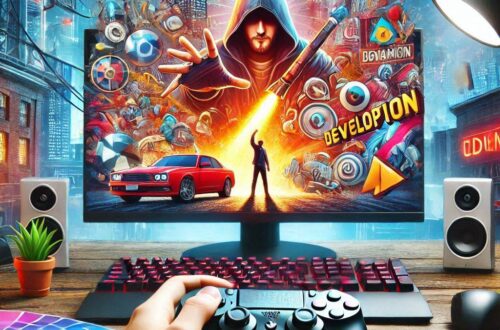Are you passionate about video games and want to turn that passion into a career? You’re not alone! Many people dream of becoming game developers and creating the next big hit. However, breaking into game development can be challenging, especially for beginners.
Before diving into game development, it’s essential to understand the basics of the industry. What are some key concepts that you should be familiar with? Let’s take a look.
Game Engine
A game engine is the software that provides developers with the tools and resources they need to create games. Some popular game engines include Unity, Unreal Engine, and CryEngine. These engines come with various features like 3D rendering, animation, physics simulation, AI, and networking support.
Game Development Process
The game development process involves several stages, including pre-production, production, and post-production. During the pre-production phase, you’ll create a concept document, which outlines the game’s goals, mechanics, storyline, characters, and other essential details.
Programming Languages
Game development requires a good understanding of programming languages like C++, C, Python, and Java. These languages are used to create games for various platforms, such as Windows, macOS, iOS, Android, and consoles like PlayStation and Xbox.
Art and Design
Game development involves creating art and design assets, such as characters, environments, and objects. You can use various software tools like Photoshop, Illustrator, Maya, Blender, and 3ds Max to create these assets. It’s essential to have a good understanding of design principles like composition, color theory, lighting, and textures to create visually appealing games.
Game Testing
Game testing is an essential part of game development that involves finding bugs, performance issues, and other problems in the game. You can use various tools like Unity Debugger, Visual Studio, and TestFairy to test your game. It’s also essential to have a good understanding of testing principles like regression testing, edge case testing, and usability testing to ensure your game is bug-free and easy to use.
Breaking into Game Development: Tips and Tricks
Networking
Networking is crucial in the game development industry. Attend gaming conferences, join online communities, and connect with other developers to learn from their experiences and get feedback on your work. You can also participate in game jams or hackathons to showcase your skills and meet other developers who share your passion for games.
Build a Portfolio
A portfolio is an essential tool for any game developer. It showcases your skills, experience, and creativity. Create a portfolio that includes your best work, including screenshots, videos, code samples, and a description of the challenges you faced while creating them. Make sure your portfolio is visually appealing, easy to navigate, and reflects your personality.
Learn from the Best
Learning from the best game developers is an excellent way to improve your skills and gain inspiration. Read books, watch tutorials, and take courses on game development. You can also follow successful game developers on social media to learn about their workflow, challenges, and success stories.
Be Patient and Persistent
Breaking into game development takes time, effort, and patience. It’s not an overnight success story, and you may face setbacks and rejections along the way. However, it’s essential to be persistent and keep learning from your mistakes. Remember that every successful game developer started as a beginner, so don’t give up on your dreams!

Real-Life Examples: Success Stories in Game Development
Shigeru Miyamoto
Shigeru Miyamoto is a legendary Japanese video game designer and producer best known for creating Super Mario Bros. He started his career in the game industry as an art director at Nintendo and eventually became one of the company’s most influential executives. His games have sold millions worldwide, and he is widely regarded as one of the greatest game designers of all time.
Markus Persson (Minecraft)
Markus Persson, also known as Jeb, is the creator of Minecraft, one of the most popular video games of all time. He started working on Minecraft in 2009 and released the first version in 2011. It quickly gained a large following and was later acquired by Microsoft for $2.5 billion in 2014. Persson’s success story demonstrates the power of creativity, perseverance, and hard work in game development.
Jordan Thomas (Among Us)
Jordan Thomas is the creator of Among Us, a popular multiplayer social deduction game that has taken the gaming world by storm. He started working on the game as a hobbyist in 2018 and released it on Steam in 2019. The game’s success can be attributed to its addictive gameplay, charming art style, and active community of players.
Summary
Breaking into game development can be challenging, but it’s also incredibly rewarding. With the right skills, mindset, and approach, you can turn your passion for games into a successful career. Remember to network, build a portfolio, learn from the best, and be patient and persistent. By following these tips and studying real-life examples of successful game developers, you’ll be well on your way to creating the next big hit in the world of gaming.
FAQs
What skills do I need to become a game developer?
To become a game developer, you need to have skills in programming languages like C++ and C, art and design software tools like Photoshop and Blender, and game engines like Unity and Unreal Engine.
How long does it take to break into game development?
Breaking into game development can take anywhere from a few months to several years, depending on your skills, experience, and dedication. It’s essential to be patient and persistent, as success in this field takes time and effort.
Can I become a game developer if I have no coding experience?
While programming skills are important in game development, it’s not necessary to have coding experience to get started. Many game development roles require a combination of artistic and technical skills, so if you have experience in art or design, you may still be able to contribute to game development projects.





